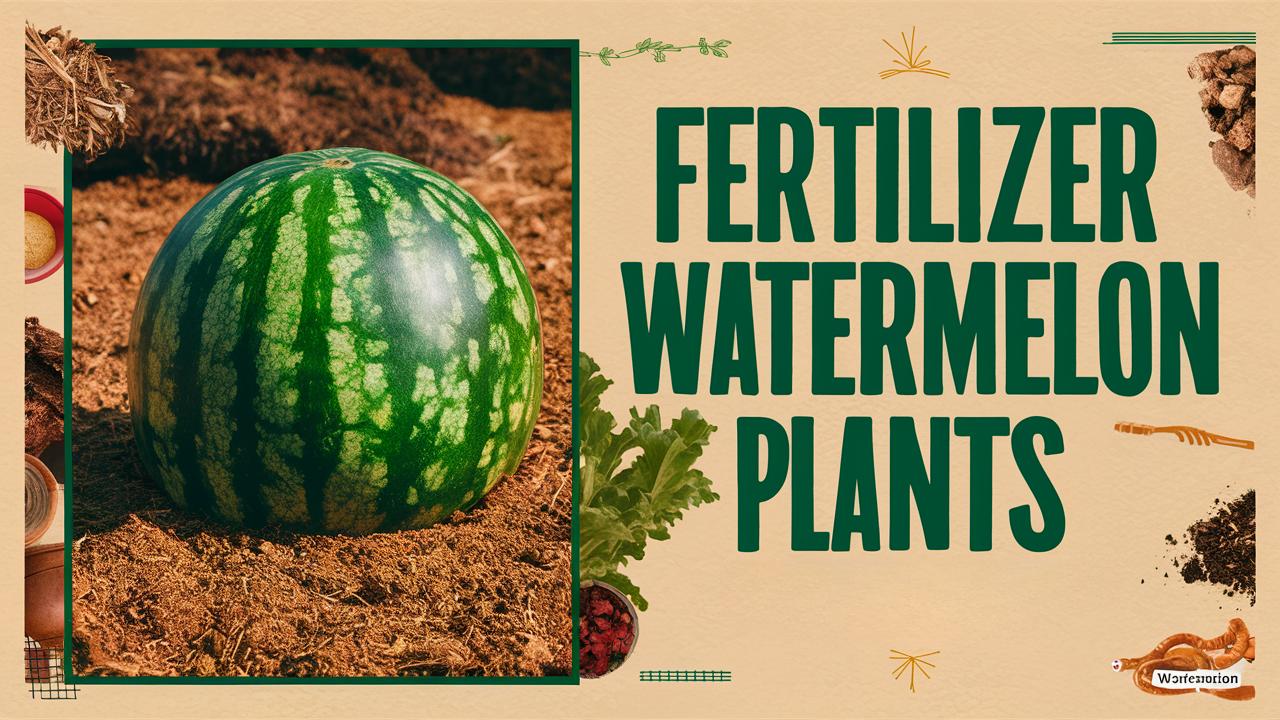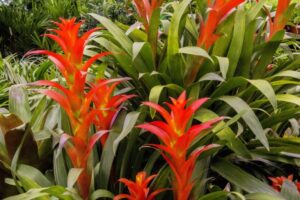In this guide, we will dig into the essential factors to consider when selecting fertilizer for your watermelon plants, ensuring they thrive in your garden.
Fertilizer For Watermelon Plants
| Image | Name | Rating | Shop |
|---|---|---|---|
 | Melon Vine Fertilizer |  | |
 | Miracle-Gro Performance Organics Edibles Plant Nutrition |  | |
 | VeggieFeED |  |
Melon Vine Fertilizer
The LEAVES AND SOUL Professional Liquid Melon Fertilizer is a great option to consider when looking for a fertilizer specifically designed for watermelon plants. This liquid plant food offers a balanced blend of nitrogen, phosphorus, and potassium that promotes robust vine growth, strong root systems, and healthy melons.
We recommend this product because it’s easy to use and formulated to nourish all types of melon throughout every stage of their development. The fertilizer is made with high-quality ingredients and can be mixed with water effortlessly, making it a convenient alternative to traditional soluble fertilizers. Overall, the LEAVES AND SOUL Professional Liquid Melon Fertilizer is a great choice for gardeners looking to optimize their harvest and grow healthy, vibrant melons.
Miracle-Gro Performance Organics Edibles Plant Nutrition
Miracle-Gro Performance Organics Edibles Plant Nutrition Granules is a great option when it comes to fertilizing your watermelon plants. This OMRI listed plant food provides essential nutrients that can promote bigger harvests, and the use of organic ingredients makes it an attractive choice for gardeners looking for more natural options.
One key benefit of this product is its ability to provide sustained nutrients over a long period – just reapply every 4-6 weeks and water regularly, and you’re good to go. The fact that it covers up to 220 sq. ft. means that one bag can support multiple plants at once, making it a cost-effective option in the long run. Overall, Miracle-Gro Performance Organics Edibles Plant Nutrition Granules is a solid choice for anyone looking to fertilize their watermelon and other edible crops with ease.
VeggieFeED
For watermelon plants, we recommend Jack’s Classic 12-15-30 Veggie Feed Water-Soluble Fertilizer with Micronutrients. This product is specifically designed for blooming vegetable plants like watermelons and provides the necessary nutrients for vigorous growth from roots to green foliage.
This fertilizer can be used in various ways, including foliar spraying or as a root feed. It comes in a powdered form that’s easy to mix with water, making it convenient to create multiple gallons of liquid fertilizer at once. The included measuring spoon ensures you get the right amount for your plants. Plus, the added micronutrients provide optimal growth and health without requiring additional feeding. This product is perfect for watermelon farmers or gardeners looking to give their plants an edge.
GreenGrower Fertilizer Concentrate
The Triple 10 All Purpose Liquid Fertilizer is a suitable choice for watermelon plants due to its all-purpose formula and ability to meet the needs of plants throughout their growth stages. Its balanced N-P-K ratio of 10-10-10 provides essential nutrients for healthy plant development, while the added amino acids and seaweed extract promote overall vitality.
This fertilizer is also a good option because it’s highly concentrated, allowing you to mix 1-2 oz per gallon of water and making up to 32 gallons of solution. This means you can easily adjust the dosage according to your plant’s needs, and continue use every 1-2 weeks for optimal results. The easy measure and pour bottle makes application a hassle-free process.
Watermelon Stalk Protector
For watermelon plants, you’ll want a fertilizer that promotes healthy growth and prevents breakage. We recommend 𝐏𝐑𝐄𝐌𝐈𝐔𝐌 Liquid Silica Plant Supplement – 8oz (250mL), a liquid silica boost fertilizer specifically designed for watermelon plants.
This product is the perfect solution to strengthen your watermelon plant’s stalks and prevent breakage. It also protects delicate leaves from browning, and works well in both hydroponic and soil-based systems. Additionally, it helps your watermelon plants resist environmental stress such as heat, drought, and humidity, and makes it easy to mix and apply via watering cans, hose-end sprays, or foliar sprays.
Root Revive
This fruit & bloom booster fertilizer from Farmer’s Secret is a great choice for watermelon plants. It works by strengthening the plant’s roots, allowing it to take in more nutrients and produce abundant fruit.
As a super concentrated formula, even a little bit goes a long way – simply dilute with water at a rate of 1 teaspoon per 2 gallons of water and pour or spray onto your plants as part of their regular watering routine. Repeat every 2-4 weeks for optimal results, making it an easy and effective option to help your watermelon plants thrive.
Miracle-Gro Shake ‘N Feed Plant Food
For your watermelon plants, we recommend Miracle-Gro Shake ‘N Feed Tomato, Fruit & Vegetable Plant Food. This product is designed to provide long-lasting nutrition for up to 3 months, which is especially beneficial for growing heavy-producing watermelons.
With calcium as a key ingredient, this plant food helps to strengthen the walls of your plants’ cells, resulting in higher-quality and longer-lasting fruit. The convenient shake-and-feed formula makes it easy to apply directly into the soil around your container or in-ground plants. Reapply every 3 months for optimal results and regular watering will help you grow a thriving garden all season long.
How to Choose a Fertilizer for Watermelon Plants
Growing watermelons can be an incredibly rewarding experience, especially when you bite into that juicy, sweet flesh on a hot summer day. However, to achieve those mouthwatering results, you need to ensure that your watermelon plants are well-nourished. Choosing the right fertilizer is crucial to promoting healthy growth and fruit production.
Understanding Your Watermelon Plants
Before diving into the specifics of fertilizers, it is vital to understand the unique nutritional needs of watermelon plants (Citrullus lanatus). Watermelons are heavy feeders, which means they require a higher supply of nutrients compared to less demanding crops. They thrive in warm weather and well-draining soil and need assistance in obtaining the right balance of nutrients throughout their growth cycle.
Watermelon plants have different phases of growth, including seedling, vegetative, and fruiting stages. Each of these phases may require varying amounts of different nutrients, which is where a targeted fertilization strategy comes into play.
Nutrient Requirements for Watermelons
When choosing a fertilizer for watermelons, it’s essential to understand the core nutrients that these plants need:
1. Nitrogen (N)
Nitrogen is critical for the vegetative growth of watermelon plants. It promotes lush green foliage and is essential for photosynthesis. However, too much nitrogen during the fruiting phase can result in excessive vine growth at the expense of fruit production. Therefore, a balanced approach is necessary.
2. Phosphorus (P)
Phosphorus is crucial for root development and flowering. It helps in the establishment of strong roots which can absorb moisture and nutrients effectively. This nutrient is particularly important during the initial growth stages and early flowering to encourage the development of strong plants and fruits.
3. Potassium (K)
Potassium plays a central role in fruit development and quality. It helps in regulating water uptake, improving overall plant health, and enhancing the sweetness and flavor of the fruits. A potassium-rich fertilizer variant is vital during the fruiting phase.
4. Secondary Nutrients and Micronutrients
Additionally, watermelon plants also require secondary nutrients like calcium, magnesium, and sulfur, as well as micronutrients such as iron, manganese, boron, and zinc. These are usually needed in smaller quantities but are equally important for balanced growth and healthy fruits.
Soil Testing: The First Step in Choosing Fertilizer
Before applying any fertilizer, it’s crucial to conduct a soil test. This test will provide valuable insights into the current nutrient levels, pH, and overall health of your soil. Understanding what your soil lacks (or has in excess) will guide you in selecting the most appropriate fertilizer.
How to Conduct a Soil Test
Collect Samples: Use a trowel to gather soil samples from various spots in your planting area, ideally from 6 to 8 inches deep. Mix these samples in a clean bucket.
Dry and Package: Let the soil dry out for a day, and then package it in a soil testing kit or bag, as specified by the testing service.
Choose a Testing Service: Many local agricultural extensions, universities, or private labs offer soil testing services. Choose a reputable provider.
Review Results: After a week or two, you will receive results indicating pH, nutrient levels, and recommendations for amendments.
Types of Fertilizers
Once you know the nutritional requirements of your watermelon plants and the deficiencies that may exist in your soil, you can explore different types of fertilizers available in the market.
1. Synthetic Fertilizers
Synthetic fertilizers are chemically manufactured and typically provide nutrients in a concentrated form. They come in various formulations, such as granular, liquid, and water-soluble formats. Some benefits of using synthetic fertilizers include:
Fast Acting: They provide an immediate source of nutrients to plants, making them ideal for quick fixes.
Controlled Nutrient Release: Some synthetic fertilizers are designed for slow-release, allowing nutrients to be available over time.
However, it’s crucial to be cautious when using them, as over-application can lead to nutrient runoff, harming the environment.
2. Organic Fertilizers
Organic fertilizers are derived from natural sources, such as compost, animal manure, or plant materials. They not only provide nutrients but also improve soil structure and microbial activity. Benefits include:
Sustainable: They contribute to soil health and fertility over the long term.
Safer for the Environment: Minimal risk of runoff and pollution due to natural sources.
Some common organic fertilizers suitable for watermelons include compost, well-rotted manure, and fish emulsion.
3. Slow-Release Fertilizers
These products are designed to release nutrients gradually over time, which can be perfect for crops like watermelons that benefit from a steady supply of nutrients. Items like Osmocote or other brands that offer slow-release formulations can help ensure consistent growth.
4. Liquid Fertilizers and Foliar Feeding
Liquid fertilizers allow for rapid nutrient absorption and can be applied directly to soil or as a foliar spray. This method is particularly helpful for addressing specific nutrient deficiencies recognized through soil tests.
Determining the Right Fertilizer Ratio
Understanding N-P-K ratios (Nitrogen-Phosphorus-Potassium) is essential for selecting the right fertilizer for watermelons. Here’s how ratios work and what you should look for:
During Planting: Choose a fertilizer with a higher phosphorus content (e.g., 5-10-5 or 5-20-20) to promote root development.
When Vining: As plants grow, a balanced fertilizer (e.g., 10-10-10 or 14-14-14) is beneficial to ensure healthy foliage.
Fruiting Phase: Move towards fertilizers higher in potassium (e.g., 6-12-24 or 5-15-30) to improve fruit quality and development.
Timing Your Fertilization
Timing is just as important as the type of fertilizer you use. Watermelon plants have distinct growth stages that will dictate when to fertilize:
1. Before Planting
In preparation for planting, work your chosen fertilizer into the soil. This usually occurs a few weeks before you intend to plant the seedlings or seeds.
2. When Seedlings Emerge
Once the seedlings break through the soil, it’s an ideal time for a light application of fertilizer to give them a boost as they establish their roots.
3. Mid-Vegetative Stage
A follow-up application can be performed when the plants begin to vine, typically a few weeks after the initial fertilizer application. Ensure it aligns with the growth of the leaves.
4. When Flowers Appear
A final application, rich in potassium, should coincide with blooming. This timing is crucial for maximizing fruit set and quality.
Addressing Nutrient Deficiencies
Throughout the growing season, keep an eye out for signs of nutrient deficiencies, which can manifest in various ways:
Yellowing Leaves: Often indicates a nitrogen deficiency.
Poor Root Development: May suggest a lack of phosphorus.
Blossom End Rot: A sign of calcium deficiency often associated with potassium imbalances.
By observing these symptoms, you can respond quickly with appropriate fertilization or amendments to your soil.
Organic Amendments for Watermelon Fertilization
If you prefer to garden organically, there are several organic amendments you can incorporate into your soil to provide essential nutrients for watermelons. Here are a few options:
Compost: Enriches soil and provides a broad spectrum of nutrients.
Bone Meal: A great source of phosphorus that facilitates root growth.
Kelp Meal: A rich source of potassium that promotes fruit development.
Fish Emulsion: A liquid fertilizer filled with nitrogen and trace elements, perfect for a nutrient boost.
Conclusion: Choosing the Right Fertilizer
Choosing the right fertilizer for watermelon plants is an art that combines understanding the specific needs of the plants, the characteristics of your soil, and the types of fertilizers available. Through soil testing, recognizing nutrient needs, and timing applications appropriately, you can ensure that your watermelons receive the nutrients they require to flourish.









